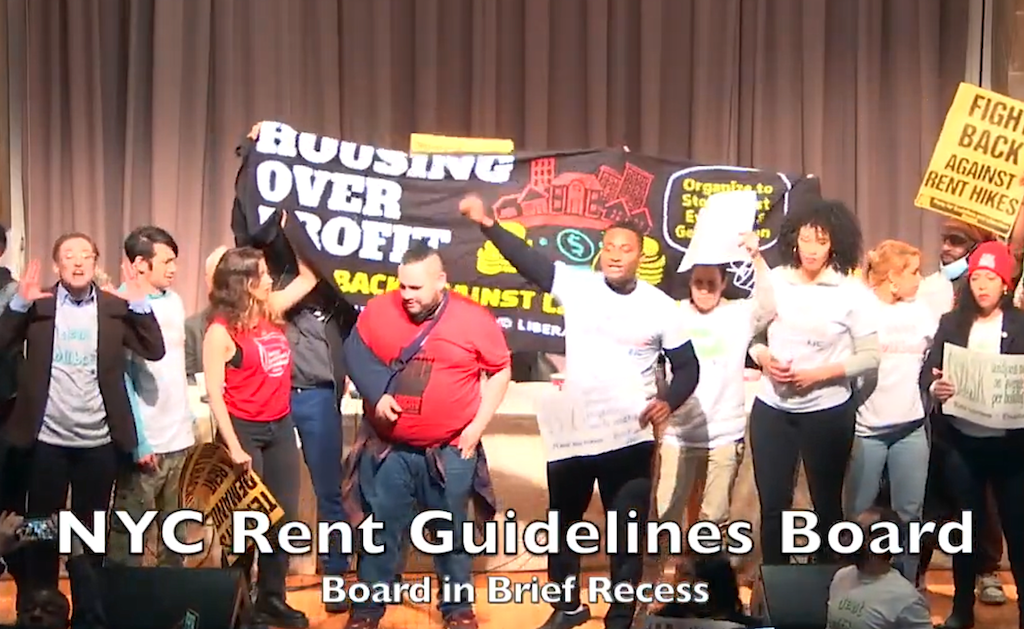On June 21 in the East Village at The Cooper Union’s Great Hall, the New York City Rent Guidelines Board will vote on how much to raise rents for the city’s more than 1 million rent-regulated apartments — about 45 percent of the city’s rental housing stock.
The R.G.B. has offered a “range” of possible increases — from 2 percent to 5 percent for a one-year lease, and 4 percent to 7 percent for a two-year lease. Clearly, a rent freeze is not on the table. Yet, tenants are already paying way too much of their salary toward rent.
In what tenant activists call the “usual charade,” the R.G.B. will reach a “reasonable compromise” and vote to O.K. increases, likely of 3 percent and 5 percent.
For all his faults, former Mayor de Blasio held the line on rent hikes. For four of his eight years in office, there was a partial rent freeze and low rent increases. It was greatly appreciated by tenants.
Mayor Adams, though, is clearly aligned with New York City’s landlords and real estate, given that the R.G.B., under his watch, is now proposing significant rent hikes for the second straight year.
Adams plays it both ways, saying it’s important to protect tenants but that landlords, particularly small ones, need more revenue so they can make a profit, plus safely maintain their buildings.
However, veteran tenant activists, like Michael McKee of Tenants PAC, put the lie to Adams’s fence-straddling.
“The most important thing in the Rent Guidelines process is who the mayor is and who he appoints to the board,” he stated.
Going back three mayors, Bloomberg presided over what McKee called “giant increases — even during the recession, when rents should have been going down. The board has never compensated [tenants] for that,” he noted.
As a result, current rents are artificially high. This would justify rent freezes and even rent rollbacks. And, in fact, at one of this year’s preliminary R.G.B. meetings, on May 2, a group of tenants did storm the stage, leading the crowd in a chant of “Rent roll-back! Rent roll-back!” causing the hearing to be temporarily delayed.
In short, over the past 30 years, owners of rent-regulated buildings have seen their net operating income increase 50 percent — so they’re doing very well, thank you. Out of every dollar taken in, they pay around 60 cents toward building operations and maintenance, while around 40 cents goes to paying off debt service and profit. By contrast, supermarkets’ profit margin is just 3 percent to 5 percent.
Meanwhile, tenants’ wages often have not have kept pace with rent increases. Unlike landlords, not everyone is guaranteed an automatic annual raise of 5 percent, or whatever amount. People are lucky simply to keep their jobs. Many workers have to fight for their raises, if any, or scramble to find better-paying jobs — yet, landlords, like clockwork, enjoy automatic increases. Meanwhile, a decade or so rolls by, and thanks to incremental R.G.B. increases — and with mayors like Bloomberg or Adams, they’ll be large ones — a tenant’s rent may have doubled.
(It was also under Bloomberg that the idea started of offering a potential “range” of rent increases — which makes it harder for tenants to organize against, according to activists.)
Anyway, the “charade” usually plays out the same way each year. The board’s two tenant members declare the proposed increases too high, while the two landlord members insist they’re too low. In a “compromise,” the five public members — a majority of the board — offer figures somewhere in the middle.
The only way to stop unjustified increases is to “restructure the system,” according to McKee.
To that end, Housing Justice for All — a statewide movement of tenants and homeless persons — is backing a bill to shrink the R.G.B. to seven members by cutting its public members from five to three. This way, the public members won’t be able to decide the vote as a bloc — but will need one landlord or tenant member to reach the four-vote majority.
Also, under the bill, the mayor would submit his R.G.B. appointments to the City Council for approval; public hearings would be held, and the Council could nix the mayor’s picks. And Council Speaker Adrienne Adams, to her credit, has been a notably outspoken critic of rent increases.
The plan is to introduce the bill in January when the state Legislature reconvenes. We sincerely hope our legislators back this effort because the “charade” is an ongoing disaster for renters and affordability.


This is exactly why CM Carlina Rivera’s Commercial Rent Stabilization Act (Intro 93), which creates a similar Rent Guidelines Board for Commercial tenants/Rents, should die. Intro 93 benefits landlords not commercial tenants.
“Yet, tenants are already paying way too much of their salary toward rent.”
According to… whom?
Because the market says otherwise.